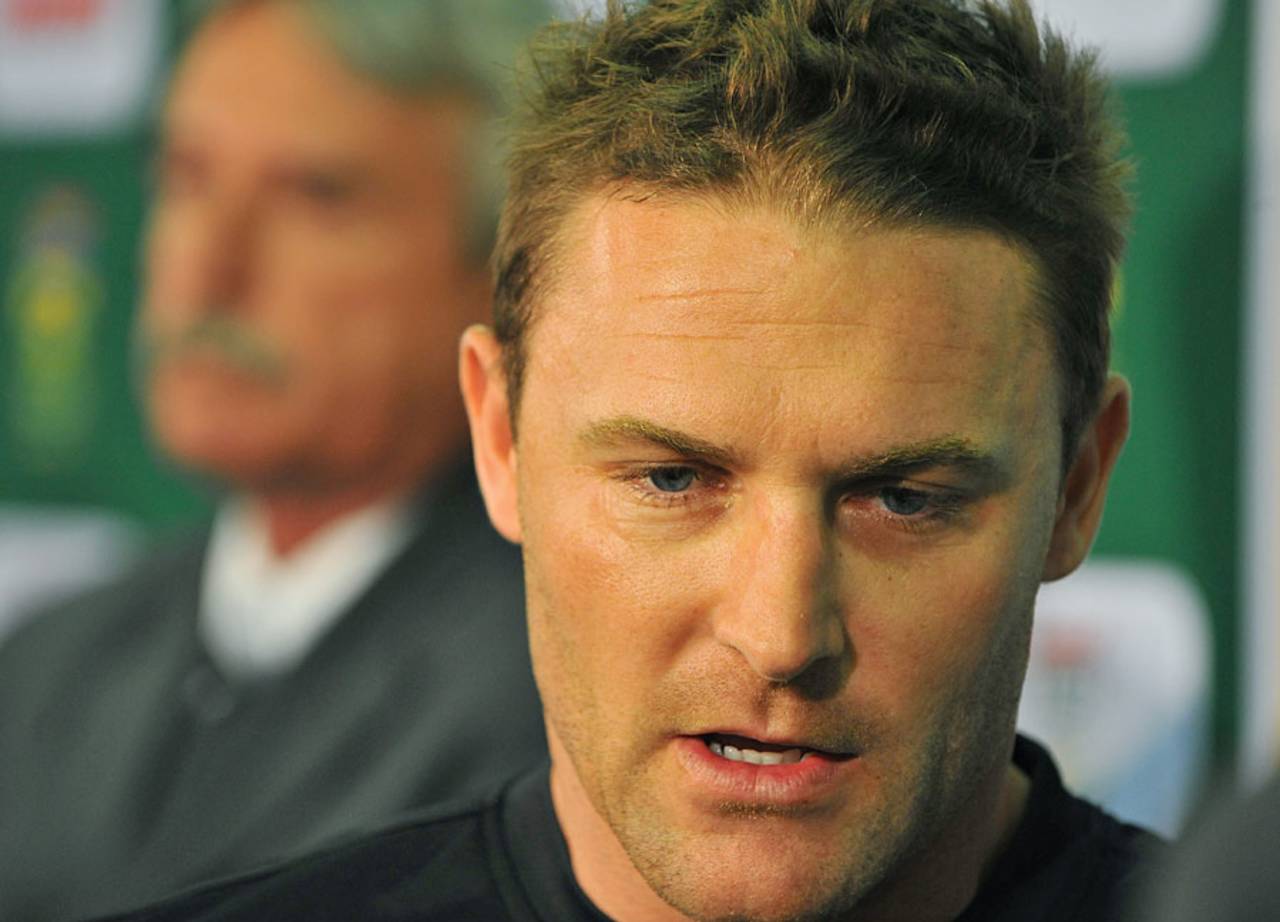McCullum v Parker
It's a sad indictment on the factionalised state of the game in New Zealand, but it may also become the event that demarcates between healthy debate and a hellish descent into unsubstantiated allegations and reputation-sullying
Paul Ford
21-Apr-2013

McCullum is the injured party and perhaps right to go to court, but legal action always makes things messier • Gallo Images
The backroom politics of New Zealand cricket have noisily burst into the front room over recent weeks, as La Cosa Nostra of eighties cricketers and their simpaticos have managed to let their cricketing governance opinions get sidetracked by an ill-founded obsession with Ross Taylor's sacking as captain.
Public empathy has been waning ever since John Parker decided to be the frontman for the posse's cause, claiming to represent more than 40 anonymous people. Damningly, the New Zealand Herald reports that dozens of people potentially in the loop with Parker's plans have been contacted and "… almost to a person they either did not return calls, did not want to be named, claimed to be part of the email chain but didn't have input into the report, or had unsuccessfully requested to be removed from future correspondence".
It sounds like there could be some rats deserting this sinking ship.
I think it is distasteful to stick the knife in but refuse to be identified as a bearer of the weapon. For the credibility of his cause, it is time Parker identified all those involved, or at least revised down the number of supporters he claims to have in cricket's "high places".
Things took a scary, lawyerly twist on Friday when Brendon McCullum revealed he was set to launch a defamation action against Parker in the courtrooms of my old town, the City of the Future, Hamilton. New Zealand coach Mike Hesson also came out and hinted that he had a couple of people with LLBs looking into things from his perspective.
Cricket and defamation suits have a rich history of making headlines, with the most famous case involving Imran Khan successfully defending himself against accusations that he'd called Beefy Botham a ball-tamperer and a racist.
The weirdest was when Pakistani journalist Asghar Ali sued Michael Atherton after the England captain referred to him as a "buffoon" in a press conference during the 1996 World Cup, the situation named by the Guardian as one of the top ten memorable post-match interviews.
In Australia there has been a plethora of defamation and libel suits, with Ian Chappell going after the publishers of the Daily Mirror and the Australian over a story that criticised his sportsmanship (unsuccessful), Clive Lloyd taking umbrage over an article entitled "Come on Dollar, Come on" that implied West Indies had thrown a match against Australia (successful)*, and Sid Barnes suing the author of a letter to the editor that suggested his poor character was to blame for his non-selection for Australia (successful).
Over on our side of the Tasman Sea, things have been much less litigious - cricket defamation cases involving thick-skinned New Zealanders are few and far between. Of course, the most prominent was when the best cricketer in Canberra, Chris Cairns, successfully won his suit (and £90,000 in damages, plus a bucket load of costs) in England against cricket politician Lalit Modi for a defamatory 24-word tweet.
Another intriguing sideshow element emerged on Friday, with McCullum represented by Garth Gallaway, son of the legendary commentator and nonagenarian Iain Gallaway. Garth moonlights as a radio commentator in Otago so there should be some robust discussions behind the scenes with fellow radio voices like Bryan Waddle.
The Zen part of me did groan a little when hearing of the legal action. In my experience, getting a lawyer involved rarely ends up with things being put right, even if a slam-dunk case is won. It's always a bit messier, a bit more frustrating, and a hell of a lot more expensive than you think at the outset. The other aspect is that there is often a suite of unintended consequences on the way through, as noses are bloodied, corners are defended, and people's lives are examined in excruciating detail.
McCullum's actions risk being seen as heavy-handed and over-sensitive, and of course they provide the Parker posse with another soapbox to climb up on. However, in this instance, McCullum is clearly very upset, and he will not have waded into the quicksand lightly. He has played smart by not gunning for cash, aiming instead for a simple retraction and an acknowledgement the claims Parker made against him "are completely false". He also makes the point that legal action is a last resort, coming after unsuccessfully seeking resolution to his concerns outside the courtroom.
Yes, the looming spectre of the McCullum v Parker action is a sad indictment on the factionalised state of the game in New Zealand, but it may also become the event that demarcates between healthy debate and a hellish descent into unsubstantiated allegations and reputation-sullying.
*April 21, 10.15GMT: Lloyd's lawsuit was incorrectly mentioned as being unsuccessful. This has been corrected
Paul Ford is a co-founder of the Beige Brigade. He tweets here